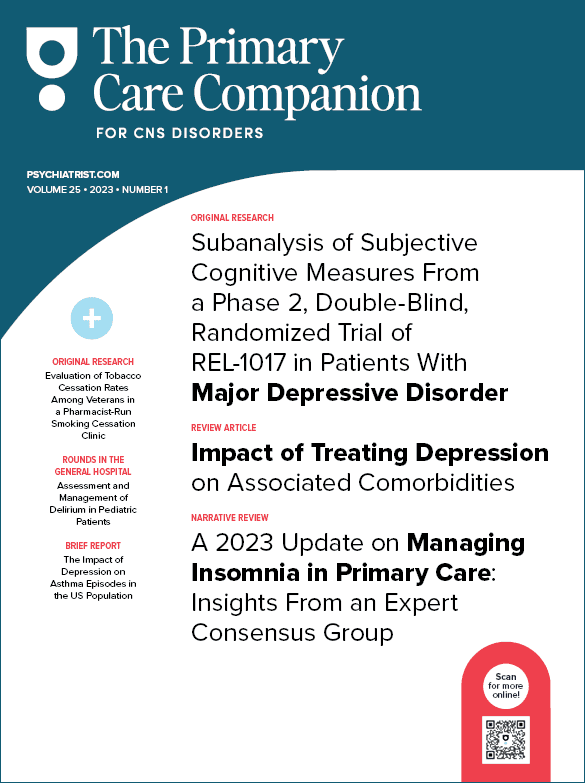aCollege of Medicine, University of Baghdad, Iraq
bPunjab Medical College, Faisalabad, Pakistan
cFaisalabad Medical University, Faisalabad, Pakistan
dMedical Research Center, Kateb University, Kabul, Afghanistan
eKabul University of Medical Sciences, Kabul, Afghanistan
*Corresponding author: Hashim Talib Hashim, MD, 400 St, Nassiryah, DhiQar 64001 Iraq ([email protected]).
Prim Care Companion CNS Disord 2021;23(2):21com02923
To cite: Hashim HT, Ramadhan MA, Ahmad S, et al. The impact of COVID-19 on patients with schizophrenia and their access to health care. Prim Care Companion CNS Disord. 2021;23(2):21com02923.
To share: https://doi.org/10.4088/PCC.21com02923
© Copyright 2021 Physicians Postgraduate Press, Inc.
Schizophrenia is a medical condition characterized by symptoms of psychosis that can be persistent or relapsing. The major signs include hallucinations (typically hearing voices), delusions, and disorganized thinking, while social detachment, diminished emotional expression, and apathy are also not uncommon.1
Coronavirus disease 2019 (COVID-19), caused by severe acute respiratory syndrome coronavirus 2, has infected more than 100 million individuals worldwide and caused many deaths, making it a significant concern for all health care systems. Although the global prevalence of schizophrenia is 0.4%, it is a major burden on families and has several cultural implications.2 Patients with schizophrenia have a higher mortality rate with significant comorbid conditions.2 The increasing spread of COVID-19 has thus raised serious concerns that the clinical effects of the disease, particularly in regard to the increasing prevalence of schizophrenia, may become evident in subsequent years, in addition to the acute psychiatric problems associated with the current diagnosis.1,2
Decades of war and conflict have caused mental health issues for some Iraqis, as many have lost loved ones and homes and have been displaced.3 Experiences like these have put many Iraqis in a state of unrest and resulted in various mental health disorders including schizophrenia.4 With a struggling health care system and lack of facilities in Iraq, the additional burden that the mental health disorders are causing is significant.5
With the COVID-19 pandemic engulfing the world, these patients have become more vulnerable to COVID-19 infection and can have worse health results once infected. Additionally, psychotic relapses pose an additional concern. Hence, if unmonitored, an unnecessary strain would be put on a system that is already struggling to cope.2
Old age and clinical comorbidities raise mortality rates for patients with COVID-19. About 70% of all patients with schizophrenia often have 1 or more clinical conditions, including type II diabetes, chronic pulmonary disease, and coronary heart disease/hypertension.1,2
Smoking rates range from 50% to 90% among schizophrenia patients, compared to 20% to 30% in the general population and include higher smoking intensity, which is another possible risk factor for respiratory complications, although it is not yet clear if COVID-19 outcomes among smokers are worse.6 Spirometry shows that patients with schizophrenia have compromised lung function, and restrictive and obstructive pulmonary disorders are diagnosed more frequently. In addition, schizophrenia patients have higher rates of intensive care unit admissions, acute respiratory failure, mechanical ventilation, and in-hospital mortality than most patients while treated for pulmonary conditions.6
When admitted to the intensive care unit, irrespective of the cause, patients with schizophrenia also have a greater risk of acute organ failure than the general population. Many patients with schizophrenia would thus match at least 1 known risk category for COVID-19 and should be considered at an elevated risk of worse clinical results if admitted to a hospital.5,6
The COVID-19 pandemic is likely to put a huge strain on mental health centers and state psychiatric hospitals in the community. These facilities have minimal capacity for medical problems to be screened for or treated, and few have existing connections with local or state public health agencies. To ensure that they can retain essential functions in the face of staff injuries or shortages of psychotropic drugs, it is important for these organizations to establish continuity-of-operations plans.6,7
Mental health professionals are also the main point of contact with the wider health care system for their patients with severe mental illness and as such will be the first responders for many of these individuals during the COVID-19 pandemic.7,8 Patients with schizophrenia who are more vulnerable to mental health decompensation should receive special care from mental health systems and be encouraged to adhere to COVID-19 preventive measures and quarantine guidelines and should continue regular checkups for both their mental and physical health.
Received: January 14, 2021.
Published online: March 18, 2021.
Potential conflicts of interest: None.
Funding/support: None.
References (8)

- Fonseca L, Diniz E, Mendonça G, et al. Schizophrenia and COVID-19: risks and recommendations. Br J Psychiatry. 2020;42(3):236–238. PubMed CrossRef NLM
- Zandifar A, Badrfam R. COVID-19: Considering the prevalence of schizophrenia in the coming decades. Psychiatry Res. 2020;288:112982. PubMed CrossRef NLM
- Iraq: Mental health, post-war and in the time of COVID-19 | MEDECINS SANS FRONTIERES - MIDDLE EAST [Internet]. MSF website. Accessed February 5, 2021. https://www.msf-me.org/article/iraq-mental-health-post-war-and-time-covid-19
- Iraq [Internet]. Médecins Sans Frontières Australia | Doctors Without Borders website. Accessed February 5, 2021. https://msf.org.au/country-region/iraq
- More support needed for community-based mental health in Iraq: prioritizing the transition from psychiatric hospital-based to community-based mental health services [EN/AR/KU] - Iraq [Internet]. ReliefWeb website. Accessed February 5, 2021. https://reliefweb.int/report/iraq/more-support-needed-community-based-mental-health-iraq-prioritizing-transition
- Hashim HT. Convalescent plasma to treat COVID-19: its challenges in Iraq’s situation. Ethics Med Public Health. 2020;15:100564. PubMed NLM
- Cowan HR. Is schizophrenia research relevant during the COVID-19 pandemic? Schizophr Res. 2020;220:271–272. PubMed CrossRef NLM
- Hashim HT. Association between frequent urination and prolonged staying at home. Prim Care Companion CNS Disord. 2020;22(5):20m02694. PubMed CrossRef NLM
Enjoy free PDF downloads as part of your membership!
Save
Cite
Advertisement
GAM ID: sidebar-top




